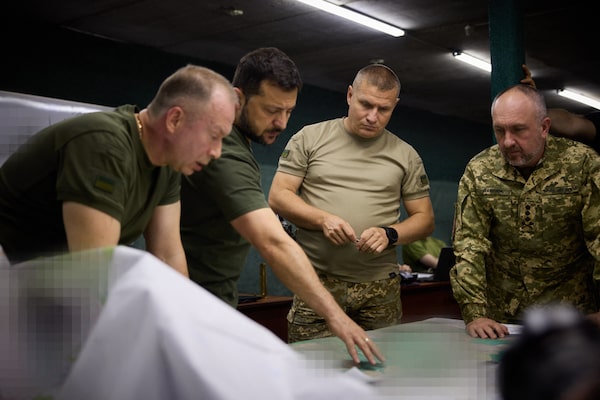
Ukraine President Volodymyr Zelensky (second from the left) and the colonel general Oleksandr Syrskyi, left, visit the brigades engaged in offensive operations in the Bakhmut sector, in Donetsk region, amid the Russian invasion of Ukraine on Sept. 5, 2023.Supplied/Getty Images
A popular wartime joke in Ukraine posits that the country can only have two official heroes: President Volodymyr Zelensky and Patron, the bomb-sniffing dog who has become something of a national mascot.
While the efforts of both the President and the Jack Russell terrier are worthy of admiration, the unspoken punchline is the omission of the man who has actually led the country’s impressive resistance to the Russian invasion, the head of the country’s Armed Forces, General Valery Zaluzhny.
The wisecrack, like most of Ukraine’s military successes, dates to 2022. On Thursday, Mr. Zelensky, who was a comedian before he went into politics, made the unknown author of the joke seem prescient, replacing the popular general in what could prove to be one of the most consequential decisions of the war.
The move ended weeks of tormented speculation and followed days of reports that Gen. Zaluzhny had already been dismissed, denied each time by the President’s Office. Mr. Zelensky put an end to the drama with a series of social media posts Thursday, writing that he had met with Gen. Zaluzhny to thank him for his service and to discuss the need for “change” in the country’s military leadership.
Mr. Zelensky said he had appointed Colonel-General Oleksandr Syrski, who formerly led the country’s ground forces, as the new commander-in-chief and had offered Gen. Zaluzhny an unspecified new role.
Col.-Gen. Syrski is a known quantity in the Ukrainian military. Under Gen. Zaluzhny’s leadership, Col.-Gen. Syrski oversaw the successful defence of Kyiv in early 2022 and spearheaded the subsequent liberation of much of the eastern Kharkiv region.
The move to replace Gen. Zaluzhny follows the failure of a major Ukrainian counteroffensive in 2023, leading to recriminations over strategy between the President’s Office and the General Staff. Mr. Zelensky was said to be irritated by a November interview Gen. Zaluzhny gave to The Economist magazine in which he referred to the war as having reached a “stalemate” – an assessment at odds with Mr. Zelensky’s more optimistic insistence that Ukraine is winning the war and will eventually drive all Russian troops from the country’s territory.
“The year 2024 can be successful for Ukraine only if there are effective changes in the basis of our defence, which is the Armed Forces of Ukraine,” Mr. Zelensky wrote in Ukrainian on Telegram. Writing in English on X, he added an upbeat “We will definitely win!”
Many Ukrainians believe there are political, as well as military, factors behind the decision. As the split between the two men deepened, opinion polls showed Gen. Zaluzhny’s personal trust rating of 92 per cent exceeding the President’s 77 per cent, leading to speculation that the general could emerge as a postwar political competitor. Rivals such Kyiv Mayor Vitaliy Klitschko and former president Petro Poroshenko openly supported Gen. Zaluzhny – Mr. Klitschko went so far as to hang a portrait of the general over his desk – and warned Mr. Zelensky not to fire him.
“It is good that there finally is a resolution and Ukraine can move on,” said Tymofiy Mylovanov, the president of the Kyiv School of Economics and a former adviser to Mr. Zelensky. “The conflict has been distracting from defence.”
But Volodymyr Dubovyk, a visiting professor at the Fletcher School of Law and Diplomacy at Tufts University, said there were “reasons to worry” about the message Mr. Zelensky’s decision has sent.
“It begs the question as to whether the tremendous consolidation and unity of Ukrainians in the face of Russia’s full-scale aggression has somewhat diminished,” Prof. Dubovyk said. “Also, is this decision an acknowledgment that the war effort has gone sideways, and even an attempt to shift blame around?”
The political wrangling in Kyiv, of course, matters far less than what happens next at the front. With Russian forces pressing forward in the east of the country – and Western military aid dramatically slowing – Gen. Syrski inherits a situation grimmer than any the Ukrainian military has faced since early in the war. The nearly destroyed city of Avdiivka, in the southeastern Donetsk region, is almost completely surrounded by Russian forces, and its fall looks increasingly inevitable. In the Kharkiv region, Kupyansk – one of the cities Gen. Zaluzhny and Col.-Gen. Syrski liberated in 2022 – looks increasingly under threat as well.
Kyiv-based analyst Oleksandr Musiienko said there would nonetheless be pressure on Col.-Gen. Syrski to continue liberating occupied territory to convince Ukraine’s allies in the West to continue providing support.
“It’s also very important to make some offensive operations, to have at least some tactical gains on the front lines, because we need to show to our Western partners that they can be confident,” Mr. Musiienko said.
On Feb. 1, Gen. Zaluzhny published an opinion piece on the CNN website that criticized “the inability of state institutions in Ukraine” to mobilize more soldiers. The military asked the government late last year to recruit between 450,000 and 500,000 more men, but Mr. Zelensky – whose party also controls parliament – has been reluctant to take such a politically unpopular step.
The decision to change military leaders midwar is perhaps the most consequential Mr. Zelensky has made since the first days of the invasion, when he decided to remain in Kyiv despite warnings from Western intelligence services that the capital could fall to Russian forces in a matter of days. It was an act of resolve that made him an international superstar, the symbol of Ukraine’s defiance.
Now, after forcing out his top commander and erstwhile co-star, Mr. Zelensky is again alone at the centre of the stage. Depending on what follows, the bouquets or brickbats will be aimed at him alone.